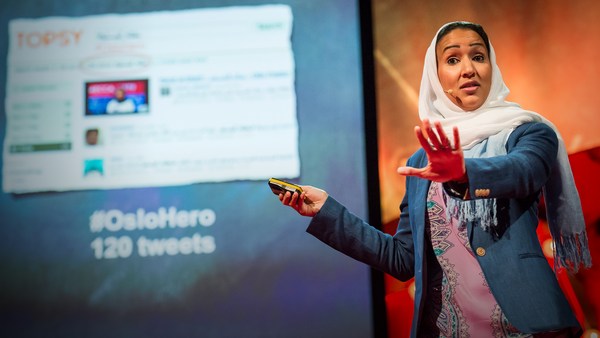[SHAPE YOUR FUTURE]
In Kenya, buses are commonly known as "matatus." They're everywhere -- and I mean everywhere. And they form a very crucial part of Kenyans' urban life. They're fun, colorfully painted buses with graffiti that depicts what is going on in Kenya and the world at large. They're informal and affordable ways for Kenyans to get around and are used by the vast majority as the main mode of transportation. But they have a couple of flaws. They can be a bit too loud, drive on the wrong side of the road to avoid traffic and can be inaccessible for women, children and people with disabilities.
Back in the 90s, my family was in the matatu business and ran a popular graffiti matatu called "Gridlock'd." "Gridlock'd" was an American black comedy film starring the popular rapper Tupac Shakur. My uncles loved Tupac, and as a result, I can still sing along to most of his songs.
Seven years ago, I stepped into the family business, and I brought a twist with me -- a feminist perspective. And this is what informs this perspective: women all over the world face sexual harassment while using public transport. In Kenya, 88 percent of women have experienced harassment while using public transportation. Unfortunately, we Kenyans are not alone. In a 2014 study conducted in the US, public transportation was the second-most common place for street harassment. This percentage is even higher in Cairo, Egypt, where a whopping 95 percent of women have experienced harassment while using public transportation. This percentage ranges all over the world, but there's not a single transport system where women do not face this type of harassment.
This leads to a massive financial loss for women, more commute time as they try to avoid dangerous routes, and eventually, they drop out of a system that isn't built for them and doesn't cater to their travel needs. So instead of women using affordable and environmentally sustainable public transportation to work, school and social events, they use their hard-earned and saved monies on safer but much more expensive means of transportation that leaves them out of building savings to ensure financial independence.
I cringe when newspaper headlines read, "Let's get rid of matatus," because millions of commuters would be stranded and thousands of youths unemployed. They say, "The system doesn't work. Let's get rid of it." But I say no. We have a lot to work with, and we need to put in the work. For the past seven years, we've worked with over 1,000+ public transport operators, 2,000 transport stakeholders and over 150 women professionals in the industry. The interventions that have yielded great impact are driven by research findings and working with public transport organizations to change the existing systems.
One way we are doing this is by offering trainings on how to improve commuter experience. For example, it used to be that buses would unexpectedly change their route either to avoid traffic or the police, and women would find themselves in totally unknown neighborhoods. But now, buses are required to display their route map, fare charts and contact details of how and whom to report any incidences.
We've also been actively recruiting and shining a spotlight on women professionals working in the industry so more women can join. When more women work in the industry, they are in positions to make changes. So we've created a community, and an active network of women professionals working in the Nairobi metropolitan area who meet regularly and attend professional development courses. Women who are joining the industry have a real voice now. We have a stronger network, more and more expertise, and more money is being put into researching gender-based violence that plagues women as they go about their day.
So instead of getting rid of matatus, let's understand travel habits. Let's train on how to improve commuter experience. Let's change behavior. Let's train on and adopt sexual harassment policies, and let's hire a more diverse workforce. Just like myself and my family, I believe public transportation can be the preferred mode of transport and workplace for millions of Kenyans.





